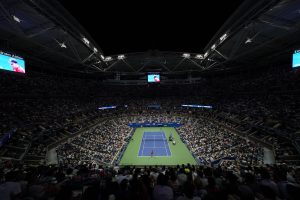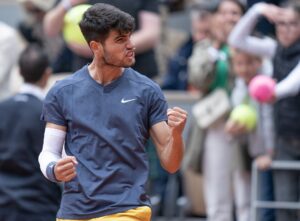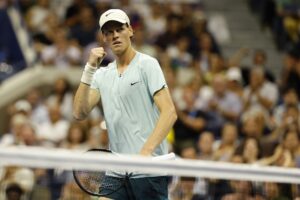Juan Martin Del Potro has terrible timing. That may seem like the oddest thing to say about a man who combines enormous power with the deftest of touches, such that he often produces both great serves and fantastic groundstrokes, but it is true. And it was demonstrated again this week at Wimbledon.
Del Potro’s quarterfinal against Rafael Nadal may just be the greatest tennis match that was watched by the fewest number of people, certainly in England, the home of Wimbledon. That is because it had the misfortune to clash with the second World Cup semi-final, between England and Croatia. The BBC has yet to release official viewing figures for the Del Potro-Nadal last eight match. However, given that England’s glorious failure at Russia 2018 attracted yet another record audience for the BBC’s rival, ITV, which was showing the football, they are unlikely to be very impressive. Nevertheless, that should not detract in any way from what was ultimately a far better match than the World Cup game, notwithstanding England’s heroics and Croatia’s sublime ball control.
In particular, the fifth and final set between Del Potro and Nadal will go down as one of the finest, if not the finest, single sets in the history of tennis. Even in our age of “Fedalic” (a compound word to incorporate Federer, Nadal, and Djokovic), when there have been many great matches and great sets, including the deciders at Wimbledon 2008 and the 2012 Australian Open, that statement can legitimately be made.
As Lukas Weese said in his match report, Nadal had to show all his toreador spirit to conquer the great Argentine bull. After Del Potro had gone two sets to one up by playing some of his finest tennis in years (certainly since the run of injuries that almost ended his career), Nadal took the fourth set 6-4 to set up the epic decider. And it certainly was epic, even more so than the World Cup semi-final.
Del Potro was broken early in the fifth set by Nadal and it appeared inevitable that the Spaniard would ultimately serve out the match to win relatively easily. However, that was to reckon without Del Potro’s sheer fighting spirit and pure tennis ability. For the next two Nadal service games, he played some of the finest tennis he has ever played, repeatedly bludgeoning or simply guiding winners into the far corners of Nadal’s side of the court. He accumulated an entire handful of break points (five in total). Unfortunately for Del Potro, Nadal was at his most wall-like in defence and somehow withstood the Argentine’s onslaught before finally serving out to win the fifth 6-4.
Nadal has been utterly wall-like for Del Potro in the last year, as this is the third time in the last four Majors that he has beaten him. First, Nadal triumphed in New York last September, defeating Del Potro in the US Open semi-final after Del Potro had defeated Roger Federer in the last eight. Then, in Paris in May, on Nadal’s beloved red clay, Nadal had comfortably won in straight sets – indeed, for the loss of only seven games in total. However, Wimbledon 2018 was completely different, as Del Potro raised his game spectacularly to push Nadal to the very brink of defeat.
The fact that most of the planet was watching England versus Croatia rather than Nadal versus Del Potro was ultimately their loss, rather than Del Potro’s. Sometimes it is quality, not quantity, that matters and the fact that the watching Andy Murray, making his commentating debut for the BBC, described the fifth set against Nadal as the finest he had ever seen live says it all about the quality and drama of the clash.
Of course, much of Del Potro’s career has been a case of bad timing. It began immaculately, as he became the first (and so far only) man to beat both Federer and Nadal at the same Major, when he won the 2009 US Open. At that time, it appeared that it would be Del Potro who would become “the third man” of tennis by rivalling Federer and Nadal for the next decade or so. Unfortunately, of course, injuries began to take their toll on the Argentine’s giant but fragile frame, and it would be Novak Djokovic who would assume that role.
Given the extent of Del Potro’s injuries, which effectively robbed him of at least two or three years of his career and even forced him to contemplate retirement, it is remarkable that he has made such a successful comeback at all. Even if, as now seems likely (especially after Wednesday), he never wins another Major, he can still be content that he has done everything in his power to get back to his best. And if nothing else, the fact that he finally led Argentina to their maiden Davis Cup win in 2016 means that he has achieved success both individually and for his country.
Nevertheless, the fact that so few people (relatively speaking) witnessed his magnificent performance against Nadal at Wimbledon somehow seems emblematic of Del Potro’s entire career. The fact is that if he had not suffered so appallingly through injury he might well have become not just the third best tennis player in the world after Federer and Nadal, but perhaps, if only for a time, the very best.
Ultimately, Del Potro’s greatest misfortune is arguably not his run of injuries but the simple, uncontrollable bad luck of being born at the wrong time. Even given his injuries, which he has done so well to recover from, if he had been born in almost any other era but this golden one for tennis, he would almost certainly have doubled or trebled his haul of Majors.
Of course, Del Potro is not alone in that respect. Indeed, it is the members of the next generation of tennis players – not the “Next Gen” of Zverev and Thiem, but literally the next generation of Dimitrov and Nishikori – who probably have most to rue. Like Del Potro, if they had not had to confront Federer, Nadal and Djokovic for a decade or more, they would undoubtedly have had a far greater chance of achieving Major wins.
This current era of tennis has been so great that it is often compared not only to other eras in tennis itself but to other golden ages in all of sport. The obvious point of comparison has been with the greatest ever era in boxing, the heavyweight era of the 1970s, when the best ever boxer (Muhammad Ali, to whom Federer can be compared for his combination of power and grace) fought it out in a succession of truly great fights with not just one awesome rival, Joe Frazier (whose strength and pugnacity invite comparisons with Nadal) but two, as he also had to face George Foreman (the third member of the trio, with whom Djokovic can be compared).
Of course, what really made the 1970s in heavyweight boxing so utterly unrivalled in the entire history of the sport was that there were not only three great fighters at the top of their game but many others. That included some fighters who were so gifted that, just like Del Potro in tennis now, in any other era they would almost certainly have become world champions themselves. Foremost among those other fighters were Ken Norton, who had his own great trilogy of fights with Ali, and Earnie Shavers, who also fought Ali in an epic encounter and was arguably the hardest and cleanest puncher of any heavyweight ever.
As with boxing in the ’70s, so with tennis now. If, ultimately, Juan Martin Del Potro comes to be regarded as the Earnie Shavers or Ken Norton of tennis, that is not so much a reflection of his own abilities as a testament to the extraordinary, indeed unprecedented, strength of the competition he has faced. And Wednesday night at Wimbledon, even if the rest of the world was looking elsewhere, was further proof of that.
Main Photo:
Embed from Getty Images






